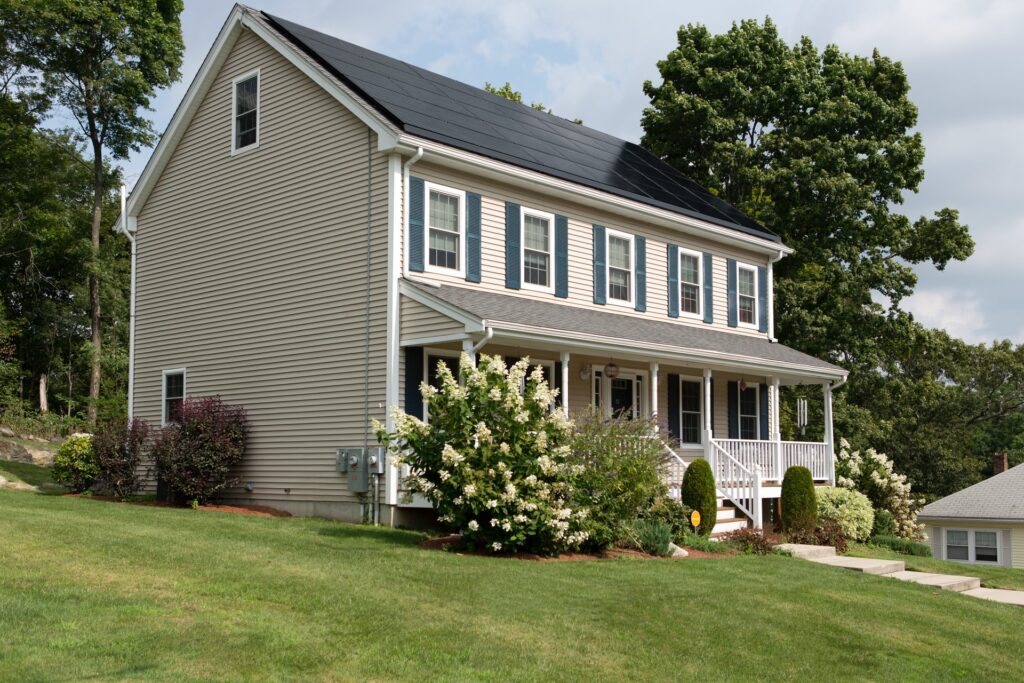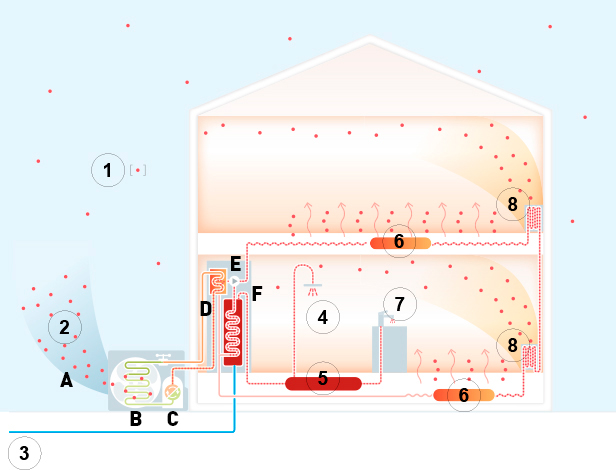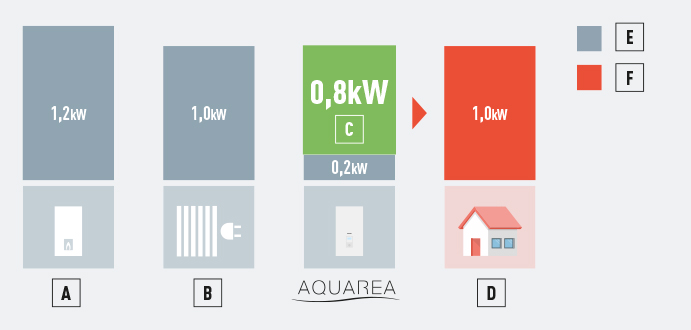How to Save £1,000s on Heating your Home and Help Save the Environment

How to Save £1000s on Heating Your Home and Help Save the Environment
This year we’ve spent a lot more time at home than we are used to. With that, comes more consideration about our household expenditure, the cost of our heating and with the continued rise of fuel prices, its worth exploring alternative “green” ways to heat your home. Turning away from gas or electric home energy saves you money, gives you more control and helps save the environment.
However, before you start investigating your options, it’s a good idea to ask yourself the following questions:
- Which upgrades will save the most money on energy costs?
- How long do you want to live in the house?
- Which will add the most value to your house?
The answers to these questions will determine which technology you choose.
Heating Your Home the “Green” Way
Check out the following green heating options that are becoming increasingly popular: solar panels, air source heat pumps and heat batteries.
Solar Panels
How do they work?
Solar panels (also known as photovoltaic or PV panels) convert energy from sunlight into electricity you can use in your home. Generating your own solar power gives you the opportunity to save on your electricity bill and your carbon dioxide emissions. If you want to learn more about how solar panels work check out this link below https://www.which.co.uk/reviews/solar-panels/article/solar-panels/how-does-solar-pv-work-adlBz0X5w5nh
What are the main pros and cons?
Pros
- First and foremost generating your own solar power gives you the opportunity to save on your your electricity bill as you generate your very own electricity.
- Reduces your carbon dioxide emissions. This environmentally friendly way of making energy produces no harmful emissions as a by-product.
- The good news is that over recent years, there have been many advances in photovoltaic technology. “the average panel conversion efficiency has increased from 15% to well over 20%. (Source Most efficient solar panels 2021 — Clean Energy Reviews)
- Solar panels are made to last: most commercial solar panels last at least 20-25 years, and some companies claim that their newer modules can last well over 40 years.
- You aren’t at the mercy of the energy companies and not subject to increases in energy prices.
- Virtually no maintenance and there’s little or no cost after the initial payment.
- 24-hour power: added to a battery storage unit you’ll have access to free electricity even when the sun isn’t shining. You’ll also be less vulnerable to blackouts and power cuts.
- “If the panels are the new technology and are aesthetically acceptable” Solar panels can increase the value of your home, ( NAEA Propertymark, the National Association of Estate Agents)
- Solar panels are eligible for a UK Government Grant.
Cons
- One thing to say first is that it’s a costly initial investment, but it has the potential for a very good return on investment (ROI). Exactly how big your ROI depends on the following: how much sunlight your roof gets where you live, how much electricity you use now, and how much you’re paying for your electricity now.
- Not all solar panels are created equally! The newer and more efficient panels will tend to cost more. This should be at the top of things to check before taking the plunge and buying expensive panels.
- To maximise what your solar panels can make, you will need a predominantly south-facing roof or one that’s not in the shade for most of the day. Read more here: https://www.which.co.uk/reviews/solar-panels
- Location also matters because different parts of the country get different amounts of daylight, the benefits of solar power will depend on where you live.
- You may not get planning permission if you own a home in a conservation area or your home is a listed building. For your best chance of success visit The Energy Savings Trust to discover how to get planning permission. Choosing a site and getting planning permission.pdf (energysavingtrust.org.uk)
- In some instances, if you are tied into old technology this could well affect the value of your home in a negative way.
We’ve already looked at solar thermal, but there are other options worth considering, including heat pumps and heat batteries.
Air Source Heat Pumps
How do they work?
These systems work by absorbing warmth from the outside air and converting it into heat inside and then pumped directly into rooms (see figure 1 below). The Panasonic heat pump is a good example of an” all in one” system that provides domestic hot water, heating and cooling from one integrated compact unit.

Pros
- “They output as much as four times more energy as they consume, so they create a cost-saving against virtually all other heating fuels.” (Source GreenGen)
- You will save money on your energy bills. Compared to an electric heater, the Panasonic Air to Water Heat Pump offers five times the output in kilowatts per every input in kilowatts (see figure 2 below).
- They have a low carbon footprint as they capture up to 80% of the heat energy from the air (Source Panasonic).
- Temperature changes are felt quickly.
- They require only require one annual maintenance service.
- Heat pumps are versatile, “an air source heat pump can often make use of an existing central heating solution,” says Neil Rollinson, of GreenGenUK
- A forced air system can also produce cool air, making it a full heating and Air Conditioning solution.
- The Panasonic heat pump claims to maintain their performance whatever the outside temperature, even down to -20 degrees. Find out more https://www.aircon.panasonic.eu/GB_en/cases/case/20-new-homes-installed-with-panasonic-aquarea-air-source-heat-pumps/
- Air source heat pumps are eligible for a UK Government Grant.

Cons
- The system needs to be located outside or connected to the house with pipes. Therefore, smaller properties may not have enough outside space.
- These systems can blow particles into rooms, causing a need for filters.
- Some systems can be noisy.
- Due to the lower heat supply, you may need to combine with other heating systems, such as underfloor heating or radiators. (Source Air Source Heat Pumps – Pros and Cons (Updated 2021) | GreenMatch)
- Ideally you should have an airtight home (well insulated).
- An air source heat pump uses approximately 15% more electricity than a ground air source. (Source Better Planet).
Ground Source Heat Pump
How do they work?
Ground Source Heat Pumps collects heat stored in the ground and converts it into usable energy to heat home and domestic hot water. The ground collector consists of the ground loops (horizontal or boreholes) buried in the ground and connecting pipework.
What are the Pros and Cons?
Pros
- The pumps that power these heating systems are inexpensive to operate, making these systems overall quite affordable.
- These systems have a life expectancy of around 20 years, while the life expectancy of an air source heat pump is 15 years (source https://www.betterplanet.co.uk/).
- Pulling heat from the ground is a more efficient system than an air source because the ground is warmer in winter than the air in winter when most heating is required.
- Low environmental impact that minimises emissions.
- Ground source heat pumps are eligible for the Green Homes Grant.
- In general heat pumps do not require planning permission. However, if you live in a conservation area or listed building, you should contact your council to check on local requirements.
Cons
- On the downside, while maintenance is relatively cheap, the initial cost of installing a geothermal system can be high, although it will last longer than an air source heat pump and is usually a better investment. Ground source heat pumps , range from £20,000- £45,000 (Source: GreenMatch)
- A geothermal system is best installed when carrying out major renovations or a new build as pipes need to be laid.
- They can only be built into some sites with a lot of space available , making them somewhat less versatile than some alternatives.
- Since electricity is needed to run the heat pump, if you aren’t using solar energy, it’s not a 100% carbon neutral system. (Source Best Home Improvements That Add Value (2021) | GreenMatch )
Whichever heat pump you choose, “It is important, to choose a reputable manufacturer who will provide a quality service, a comprehensive warranty and provide proper guidance about the buying and installation of heat pumps” says energy expert, Tony Holland of Oceanair.
Heat Batteries
How Do they Work?
Heat Batteries are relatively new for storing spare heat or electricity generated by existing renewable energy systems.
What are the Pros and Cons?
Pros
- Heat batteries are compact and take less space than a traditional cylinder.
- Sunamp, a specialist in heat batteries, say that “they are easy to fit, low maintenance and have a lifespan of over 40,000 cycles” (the equivalent of over 50 years of average use).
- They work with any energy source from renewables , such as heat pumps, wind turbines, solar thermal or solar panels.
- They are much better at storing heat than a hot water tank and therefore more efficient, The heat can then be used to provide instant hot water for showers and baths, as well as heat your radiators.
- A heat battery can save all the energy that’s created during off – peak low cost electricity times.
- The Energy Saving Trust claim that they do not to lose performance over time compared with an electrical battery.
- Heat batteries are eligible for a UK Government Grant.
Cons
- The upfront cost of installation is likely to be higher than fitting a hot water tank (Sunamp has a list price of £1300) but they will reduce running costs by 30-40% by using off-peak low-cost electricity and reducing heat losses, so will save money over time.
- They are still a fairly new technology so they’re not that many options to choose from.
Are you Eligible for a Green Homes Grant?
The Green Homes Grant has been extended until 2022, so homeowners have longer to take up the grant of £5000 towards the cost of installing energy efficient improvements. Don’t miss out, check whether you are eligible here Check if you’re eligible for a Green Homes Grant – GOV.UK (www.gov.uk)
What’s Included in the Green Homes Grant?
You need to install either primary measures (solar thermal water heating, air source heat pump, ground source heat pump, insulation or biomass boilers) or secondary measures (double glazing, mart heating controls, draught proofing).
Conclusion
Remember to shop around and do your research for the best technology that suits your home. Adopting a renewable, green heating technology isn’t just possible or desirable, its essential for the future of the planet.
Do you use any of these green technologies? How have they improved your life or reduced your recurring expenses?
If you don’t take that first step, however, you aren’t saving anything — so get started now!
We are passionate about incorporating renewable energy systems in our projects and we are more than happy to discuss suitable solutions for you. Contact us now.
